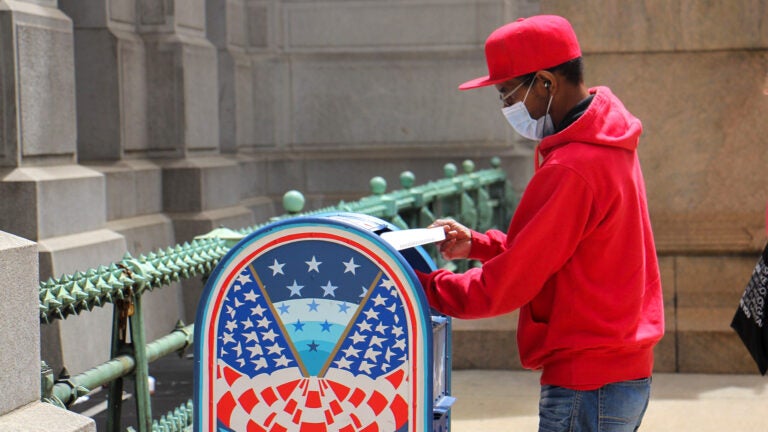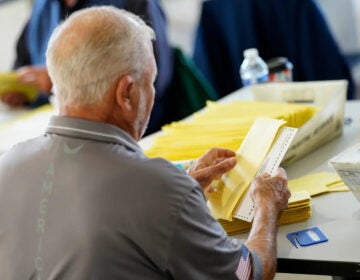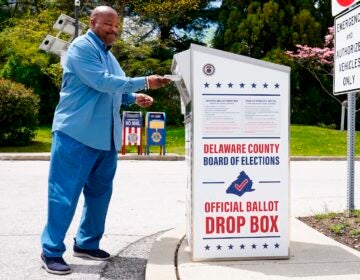Judge denies Delaware GOP lawsuit against vote-by-mail
A Delaware judge denied the state GOP’s efforts to have expanded vote-by-mail provisions declared unconstitutional.
Listen 1:34
A voter places his mail-in ballot in a box outside City Hall. (Kimberly Paynter/WHYY)
Delaware’s Chancery Court ruled Monday that mail-in ballots are necessary during the coronavirus pandemic, disagreeing with state Republicans that the process is unconstitutional.
The ruling comes a month after the Republican State Committee and two GOP members filed a lawsuit arguing mail-in ballots for the general election violate the state constitution.
Delaware legislators passed a law in late June expanding access to mail-in voting because of the coronavirus pandemic. The process was used for the recent presidential primary and the state primary, and will be permitted for the Nov. 3 general election.
Republicans argued in the lawsuit that mail-in ballots “upsets established constitutional means for voting absentee by flooding all registered voters with unsolicited applications to receive a voting-by-mail ballot, allowing any voter for any reason [or no reason at all], to vote by mail.”
They argued that mail-in voting does not meet Delaware’s constitutional statute that the legislature can adopt measures “for ensuring the continuity of government operations.”
But Vice Chancellor Sam Glasscock III disagreed in his ruling issued late Monday.
“The Plaintiffs disagree with the policy decision of the legislature. They have attempted to convince me to disagree as well. But even if they were successful, such an attempt would be inapt. The legislature, in the face of an epidemic of airborne disease and in light of the health emergency declared by the Governor, has made a determination that vote-by-mail is necessary for the continued operation of governmental functions, and that it would be impracticable to address this problem other than by otherwise-extraconstitutional means. These findings are not clearly erroneous.
“Therefore, the Plaintiffs’ Motion for Summary Judgment must be denied … their request for permanent injunctive relief must also be denied.”
GOP leader Jane Brady said she is disappointed in the decision.
“We believe factually by opening every polling place, that there was no disruption of government operations as it related to the election. And the legal basis upon which they could expand voting was only if it was necessary for the continuity of government operations. We argued there was no lack of continuity and therefore no legal basis to go forward,” she said.
Traditionally, Delaware law permits absentee ballots only if a person won’t be able to vote in person because they will be participating in “public service” of the state or nation, working elsewhere, on vacation, have an illness or physical disability or because of their religion.
The new mail-in ballot provision is based on a part of the Delaware Constitution that allows the government to adopt measures “for ensuring the continuity of government operations’’ in “periods of emergency resulting from disease” when not to do so “would be impracticable or would cause undue delay.”
The new law stipulates that “due to the highly contagious nature of COVID-19 and the need to protect the electors and polling workers in this state from infection of COVID-19, voting by mail is necessary and proper.”
Glasscock agrees, writing; “It is true, I suppose, that the few or many who were unable to vote absentee under previous law, and were willing to undertake a health risk to exercise their franchise in person, could serve as the electorate by which officials could be chosen and government ‘continued.’ But it is also clear that continuity of a democratically elected government requires meaningful participation from the citizenry. 51 The Delaware Constitution at Article I, § 3 requires that elected officials be chosen by free and equal elections. It is also true that the risk of the virus spreading among the people, following universal in-person voting, is itself inimical to the continuity of government.”
The Senate passed the measure 18-3, with all Democrats and six of the nine Republicans voting yes. It was approved 25-13 in the House, with no GOP support.
Republicans are outnumbered nearly 2 to 1 by Democrats in Delaware, and currently hold none of the nine statewide elective offices.
This year, more than 63,000 Delaware Democrats, or about 52% of them, mailed in their ballots, while more than 12,500 Republicans, or 23% of them, mailed their votes.
Republicans might be reluctant to use vote-by-mail because state and national GOP leaders have questioned the security of the mail system and the potential for voter fraud. In July, President Trump tweeted that mail-in voting will lead to the “most inaccurate and fraudulent election in history,” without showing any evidence. He also suggested that the election be delayed, something he doesn’t have the power to do.
Brady said she doesn’t think absentee ballots are problematic, and never felt people should be forced to go to the polls. She said people should be able to use absentee ballots to vote. (Glasscock agreed with the State that the constitution limits absentee ballots to very specific scenarios, but allows for a separate way to vote, and therefore mail-in ballots were necessary).
“I took the position that absentee voting where you request a ballot and you don’t have multiple applications, [as opposed to] literally tens of thousands of applications laying around in the mail boxes of people who can’t legitimately vote, or for people who are either deceased or moved, is a very good way to run an election,” Brady said.
“We’ve had people who have gotten applications to their ballots to their homes for people who don’t live there. We’ve had people get the wrong ballot. We’ve had people not properly execute their ballot so their votes were invalidated. We want everyone’s vote to count.”

Your go-to election coverage
WHYY is your source for fact-based, in-depth journalism and information. As a nonprofit organization, we rely on financial support from readers like you. Please give today.






